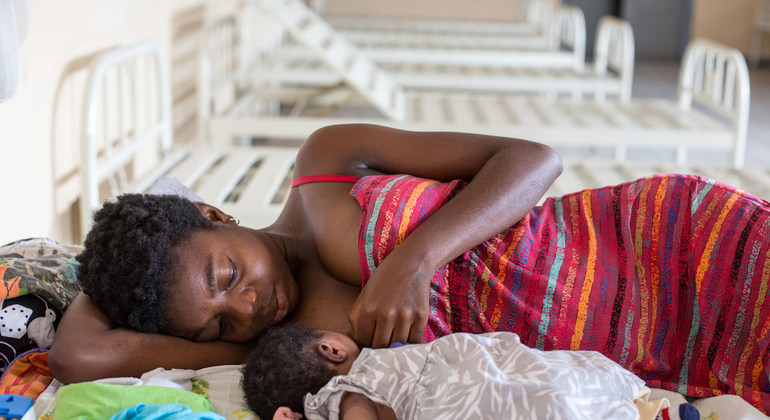World Breastfeeding Week 2019 to spotlight importance of family-friendly policies
World Breastfeeding Week is celebrated every year from 1 to 7 August to encourage breastfeeding and improve the health of babies around the world.
It commemorates the Innocenti Declaration signed in August 1990 by government policymakers, the UN World Health Organization (WHO), the UN Children’s Fund (UNICEF) and other organizations to protect, promote and support breastfeeding.
This year, WHO is working with UNICEF and partners to promote the importance of family-friendly policies to enable breastfeeding and help parents nurture and bond with their children in early life, when it matters most.
This includes enacting paid maternity leave for a minimum of 18 weeks, and paid paternity leave to encourage shared responsibility of caring for their children on an equal basis.
Find out more here.
UN working ‘intensively’ to stop Ebola in eastern DR Congo, following second case in major border town
Senior UN officials tasked with controlling the Ebola outbreak in the Democratic Republic of Congo (DRC) have responded to Tuesday’s confirmation of a second case of Ebola in Goma, a major trading town in the vast country’s restive east, near the border with neighbouring Rwanda.
On Wednesday, David Gressley, the UN Ebola Emergency Response Coordinator, and Dr. Ibrahima Socé Fall, Assistant Director-General for Emergency Response at the World Health Organization (WHO), released a joint statement announcing that they are “working intensively” to halt any further spread.
Surveillance is being stepped up at all entry and exit points in the area, but more needs to be done to eradicate Ebola, the officials said, calling for a “strong, resilient health system” to avoid a resurgence of the disease in DRC.
Read our full report here.
UN chief welcomes Greta Thunberg’s decision to sail to Climate Action Summit
UN Secretary-General António Guterres tweeted on Wednesday that he is looking forward to meeting internationally renowned climate activist Greta Thunberg when she arrives in New York for the Climate Action Summit that will take place at UN Headquarters in September.
The UN chief wrote that Ms. Thunberg, and her generation, have “grasped the urgency of the climate crisis better than many others”, and that “it’s time we listen”.
The Summit will bring together governments, the private sector, civil society, local authorities and other international organizations to develop ambitious solutions to the climate crisis.
Ms. Thunberg announced on Monday that she will be sailing across the Atlantic on the sixty-foot racing boat Malizia II in mid-August, and will continue on to Chile for the COP25 Climate Conference in Santiago, which will take place in December.
UN chief ‘strongly condemns’ bus attack in Afghanistan
UN Secretary-General António Guterres has strongly condemned an attack on a bus traveling along the Kandahar-Herat Highway in Afghanistan, in a statement released Wednesday morning.
According to news reports, dozens of civilians, mainly women and children, were killed after the bus hit a roadside bomb.
The Secretary-General reiterated that “international humanitarian law explicitly prohibits indiscriminate attacks and attacks directed against civilians and appeals to all parties to the conflict in Afghanistan to uphold their obligations to protect civilians”.
The UN chief also expressed his “deepest sympathies” to the families of the victims and to the Government and people of Afghanistan and wished a speedy recovery to those injured.
Outgoing UN agriculture agency chief hands over reigns
The social protection programmes and public policies fundamental to reducing hunger must be improved, the outgoing chief of the UN Food and Agriculture Organization (FAO) José Graziano da Silva said at a handover ceremony marking his last day at the UN agency’s helm.
On 1 August 2019 the new Director-General, China’s Qu Dongyu will take over until 31 July 2023, when his term expires.
Mr. Graziano da Silva has spotlighted FAO’s role in improving the “lives of vulnerable people” by providing technical capacity, especially to developing countries.
“I have no doubt that Dr. Qu has a lot to offer to FAO in terms of knowledge and his experience,” he said.








